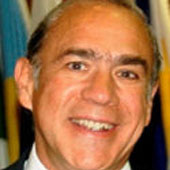The New World Order (Part III)
What are the benefits and drawbacks of the different approaches to U.S. engagement in the world?
May 21, 2009
For the most part, Americans want to remain actively engaged in the world without having to be in charge of it.
We tire of being held responsible for everything bad that happens, and always on the hook to pick up the costs.
We have grown even more skeptical of our current foreign policies when the primary benefit that they are supposed to deliver, namely greater security, fails to materialize. If “global engagement” is defined as a forward-deployed military operating in dozens of countries, and if the costs of this military remain very high, then we should expect the public to object.
And if the rest of the world looks upon this military power and our propensity to use it as a growing threat, and if Americans gain a fuller recognition that our great power and our willingness to use it increases the risks of terrorism directed against the United States, then many will demand that we change course.
But if Washington refuses to do so, or simply tinkers around the margins while largely ignoring public sentiment, then we should not be surprised if many Americans choose to throw the good engagement out with the bad, opting for genuine isolationism, with all of its nasty connotations.
That would be tragic. It would also be dangerous. For to the extent that there is a global war brewing, it will not be won by closing ourselves off from the rest of the world.
If Americans reject the peaceful coexistence, trade and voluntary person-to-person contact that has been the touchstone of U.S. foreign policy since the nation’s founding, the gap between the United States and the rest of the world will grow only worse, with negative ramifications for U.S. security for many years to come.
Our hyperactive foreign policy of the last 20 years has become an impediment to the spread of the ideas that make this country great. This should dictate a change in course toward a wise foreign policy that combines prudence and forbearance.
A similar warning was heard just after the end of the Cold War from the same man who had played an enormous role in shaping U.S. strategy in the earliest days of that long struggle. “The United States should conduct itself,” wrote diplomat and historian George F. Kennan, “as befits a country of its size and importance.”
The qualities of U.S. foreign policy, Kennan wrote, should include “patience, generosity and a uniformly accommodating spirit in dealing with small countries and small matters,” and “reasonableness, consistency and steady adherence to principle in dealings with large countries and large matters.”
“The greatest service this country could render to the rest of the world,” Kennan concluded, “would be to put its own house in order and to make of American civilization an example of decency, humanity and societal success.”
Our challenge, and it is a challenge that other great nations have faced, is to match our power to our purpose — to see our power as a means to an end, and to shape our power to suit those ends. We should possess no more than we need, and we should husband what we have with extreme prejudice.
True wisdom comes in controlling power, and that begins with an appreciation for what power does, and what it does not do. It also requires an extraordinary degree of discipline. As the Chinese philosopher Lao-Tzu said, “He who controls others may be powerful, but he who has mastered himself is mightier still.”
More than two millennia later, and half a world away, Thomas Jefferson voiced similar sentiments with respect not to one person, but to the nation that he helped establish.
It was the summer of 1815, not long after the United States had prevailed over the British in the War of 1812. Never again would foreign troops set foot on U.S. soil. And if Jefferson sensed a measure of triumphalism in the air, that was all understandable. But he hoped that it wouldn’t go to everyone’s heads.
He predicted that one day, in the not-so-distant future, Americans “may shake a rod over the heads of all, which may make the stoutest of them tremble. But I hope our wisdom will grow with our power, and teach us, that the less we use our power, the greater it will be.”
That we may “shake a rod” and make the world tremble is no longer in dispute. But whether we have the wisdom to control our power remains very much an open question.
I hope that we do. Some military power is necessary, while too much is a problem. And it is a problem that we alone can solve, if only we choose to do so.
This is the final part of a three-part series. Read Part II here.
Reprinted from The Power Problem: How American Military Dominance Makes Us Less Safe, Less Prosperous, and Less Free, by Christopher A. Preble. Copyright (c) 2009 by Cornell University. Used by permission of the publisher, Cornell University Press. All rights reserved.
The Cato Institute has offered a special discount for readers of The Globalist. Save $7 off the cover price when you enter the code “PPROBLEM” here.
Takeaways
I hope our wisdom will grow with our power and teach us that the less we use our power, the greater it will be.
If Americans gain a fuller recognition that our great power and our willingness to use it increases the risks of terrorism directed against the United States, then many will demand that we change course.
To the extent that there is a global war brewing, it will not be won by closing ourselves off from the rest of the world.
Read previous
Does Military Power Keep Us Safe? (Part II)
May 20, 2009
